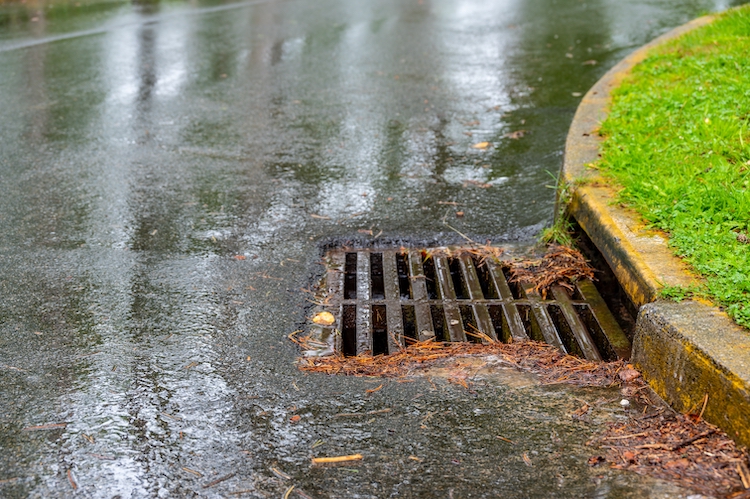Stormwater Management
Stormwater Management
What is Stormwater?
Stormwater is water from precipitation that flows across the ground and pavement when it rains or when snow and ice melt. The water seeps into the ground or drains into storm sewers. These are the drains you see at street corners or at low points on the sides of streets. Collectively, the draining water is called stormwater runoff.
Did You Know?
Impervious surfaces such as rooftops, driveways, sidewalks, and streets prevent stormwater runoff from naturally soaking into the ground.
As stormwater flows over driveways, lawns, and sidewalks, it picks up debris, chemicals, dirt, pet waste and other pollutants. Stormwater can flow into a storm sewer system or directly to a lake, stream, river, wetland, or coastal water. Anything that enters a storm sewer system is discharged untreated into the waterbodies we use for swimming, fishing, and providing drinking water.
What Can You do to Help?
By adopting the following healthy habits, residents can help protect lakes, streams, rivers, wetlands, and coastal waters by keeping common pollutants like pesticides, pet waste, grass clippings, and automotive fluids off the ground and out of stormwater.
Vehicle & Garage
- Use a commercial car wash or wash your car on a lawn or other unpaved surface to minimize the amount of dirty, soapy water flowing into the storm drain and eventually into your local waterbody.
- Check your car, boat, motorcycle, and other machinery and equipment for leaks and spills. Make repairs as soon as possible. Clean up spilled fluids with an absorbent material like kitty litter or sand, and don’t rinse the spills into a nearby storm drain. Remember to properly dispose of the absorbent material.
- Recycle used oil and other automotive fluids at participating service stations. Don’t dump these chemicals down the storm drain or dispose of them in your trash.
Lawn & Garden
- Use pesticides and fertilizers sparingly. When use is necessary, use these chemicals in the recommended amounts. Avoid application if the forecast calls for rain; otherwise, chemicals will be washed into your local stream.
- Select native plants and grasses that are drought- and pest resistant. Native plants require less water, fertilizer, and pesticides.
- Sweep up yard debris, rather than hosing down areas. Compost or recycle yard waste when possible.
- Don’t overwater your lawn. Water during the cool times of the day, and don’t let water run off into the storm drain.
- Cover piles of dirt and mulch being used in landscaping projects to prevent these pollutants from blowing or washing off your yard and into local waterbodies. Vegetate bare spots in your yard to prevent soil erosion.
Septic System Use & Maintenance
- Have your septic system inspected by a professional at least every 3 years, and have the septic tank pumped as necessary (usually every 3 to 5 years). Alternative systems with electrical float switches, pumps, or mechanical components should be inspected more often, generally once a year. A service contract is important since alternative systems have mechanized parts.
- Care for the septic system drain field by not driving or parking vehicles on it. Plant only grass over and near the drain field to avoid damage from roots.
- Flush responsibly. Flushing household chemicals like paint, pesticides, oil, and antifreeze can destroy the biological treatment taking place in the system. Other items, such as diapers, paper towels, and cat litter, can clog the septic system and potentially damage components.

Home Repair & Improvement
- Before beginning an outdoor project, locate the nearest storm drains and protect them from debris and other materials.
- Sweep up and properly dispose of construction debris such as concrete and mortar.
- Use hazardous substances like paints, solvents, and cleaners in the smallest amounts possible, and follow the directions on the label. Clean up spills immediately, and dispose of the waste safely. Store substances properly to avoid leaks and spills.
- Purchase and use nontoxic, biodegradable, recycled, and recyclable products whenever possible.
- Clean paint brushes in a sink, not outdoors. Filter and reuse paint thinner when using oil-based paints. Properly dispose of excess paints through a household hazardous waste collection program or donate unused paint to local organizations.
- Reduce the amount of paved area and increase the amount of vegetated area in your yard. Use native plants in your landscaping to reduce the need for watering during dry periods. Consider directing downspouts away from paved surfaces onto lawns and other measures to increase infiltration and reduce polluted runoff
Pet Care
- When walking your pet, remember to pick up the waste and dispose of it properly.
- Flushing pet waste is the best disposal method. Leaving pet waste on the ground increases public health risks by allowing harmful bacteria and nutrients to wash into the storm drain and eventually into local waterbodies.
Swimming Pool & Spa
- Drain your swimming pool only when a test kit does not detect chlorine levels.
- Whenever possible, drain your pool or spa into the sanitary sewer system.
- Safely store pool and spa chemicals to prevent leaks and spills, preferably in a covered area to avoid exposure to stormwater.
SOURCE: EPA Homeowner’s Guide


